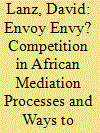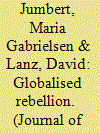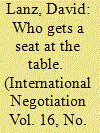| Srl | Item |
| 1 |
ID:
180894


|
|
|
|
|
| Summary/Abstract |
This article seeks to make sense of the dynamics of competition in African mediation processes and to outline approaches for effective cooperation between mediators. To this end, it analyzes four cases of recent peace processes: Sudan (1994–2005), Kenya (2008), Madagascar (2009–2013) and South Sudan (2013–2015). The article identifies four driving forces of competition among mediators: clashing interests of states involved in mediation, overlapping mediation mandates, incompatible norms guiding conflict resolution, and mediators’ lack of performance. These factors risk undermining peace processes unless the involved mediators and guarantors take active steps to mitigate the negative effects of competition. This can be done through ‘hierarchical coordination,’ where a recognized authority takes the lead and allocates roles to other actors, or through ‘collaborative cooperation,’ where partners have unity of purpose and decide on a division of labor based on comparative strengths.
|
|
|
|
|
|
|
|
|
|
|
|
|
|
|
|
| 2 |
ID:
120919


|
|
|
|
|
| Publication |
2013.
|
| Summary/Abstract |
This article is concerned with the rebellion in Darfur as a way to illustrate the politics of insurgency in the era of globalisation. We first show how the Darfur rebels have projected their struggle onto the world stage, before examining the effects that this has engendered. On the one hand, Darfur's global profile solidified the rebels' cause and co-opted international actors in support of it. This translated into real leverage for the rebels, and it constrained the Sudanese government by reducing its ability to use brute force. At the same time, internationalisation encouraged the Darfur rebels to make maximalist demands at the expense of articulating a broader political vision addressing the root causes of conflict. Moreover, the substitution of local legitimacy for international connections lowered the barriers of entry for new groups and thus promoted fragmentation. The combination of these effects makes for intractable conflict scenarios, the current situation in Darfur being a case in point.
|
|
|
|
|
|
|
|
|
|
|
|
|
|
|
|
| 3 |
ID:
105187


|
|
|
|
|
| Publication |
2011.
|
| Summary/Abstract |
Who gets a seat at the table and who does not is an important consideration for successful peacemaking. However, current research does not provide sufficient guidance for understanding the politics of participation in peace negotiations. This article develops a conceptual framework for understanding these dynamics. Its central theme is that the inclusion or exclusion of a given actor in peace negotiations is affected by two independent factors. One factor pertains to the practical requirements of the peace process and addresses the following question: does the participation of a given actor augment the chance of reaching a sustainable peace settlement? The other factor relates to the normative dimension of peace talks: is the participation of a given actor consistent with the values of international mediators and sponsors of peace negotiations? The article argues that the dynamics of inclusion and exclusion result from the interplay of these two factors. The most straightforward situation for mediators is when practical requirements and international norms are mutually reinforcing. Difficulties arise from scenarios where practical effectiveness and norms contradict each other. This is the case when the involvement of a given person (or group) is imperative in terms of the peace process, but difficult to justify politically because this person has committed terrorist acts or is indicted by an international court.
|
|
|
|
|
|
|
|
|
|
|
|
|
|
|
|